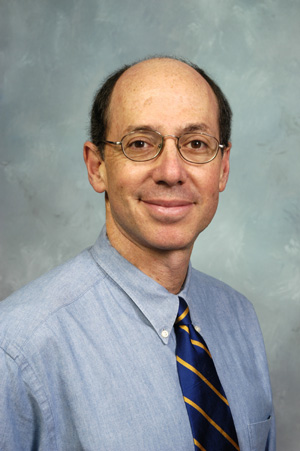Students in Dr. Vern Katz's class squirmed the day they learned about parasites, especially when he showed a video of worm-infested intestines.
"For this subject, it helps to have the actual," said Katz, who teaches the introductory course Understanding Human Disease. "It sticks better in their minds."

This is exactly why students like to learn from Katz, who himself is "the actual" -- a medical professional. Katz is considered an authority in the field of perinatology, the management of high risk pregnancy. He authored the thousand-page text book, Comprehensive Gynecology, and each week he sees about 100 patients in his Eugene practice.
Somehow he also finds time to teach hundreds of students each year at the UO. And he does it for free.
Every year, two to three of the courses offered in the Department of Human Physiology are taught by Eugene physicians like Katz, and dozens more are invited to give guest lectures to various classes.
Area physicians are so heavily involved that the department has come to rely on them. (Read more in our main feature story: The Doctor Is In)
"Students benefit because not only do they learn science, but they want to know where they can apply it," said human physiology Associate Professor Li-Shan Chou, who often invites physicians to speak to his students. "If we just teach everything out of the book, students get bored."
About a third of the lectures for the Biomechanics of Human Joints course are given by local orthopedic surgeons, according to Associate Professor Andy Karduna. He invites specialists to speak on various areas of expertise, such as the spine or foot, or reconstructive surgery.
Karduna has been impressed by the willingness of area physicians to speak to his classes. And the fact that it doesn't cost the university is a huge bonus.
It's a bonus for Katz, too, who missed teaching. Before moving to Eugene in 1996, Katz had been teaching at the medical school at University of North Carolina, Chapel Hill for 12 years. It wasn't long after Katz and his family moved to Eugene that he discovered the human physiology department at UO and started giving guest lectures.
Katz could see the department was in desperate need of a basic class on how to understand medicine. But there weren't enough faculty members to add the class. So Katz volunteered to design and then teach the course, which now regularly exceeds its 100-student-per-course cap. It's a hit among undergraduates from a wide variety of majors, including business, philosophy, psychology and comparative literature. Every year several of them inevitably change majors to human physiology.
"I think students really appreciate having clinicians in the classroom," said Associate Professor Paul van Donkelaar, who often invites area physicians to his classes. "Clinicians see a broad spectrum of patients and that makes for great anecdotes. It makes their lectures especially interesting."
Dr. Rick Padgett, a Eugene cardiologist, regularly accepts invitations to lecture for the department because he's always had an interest in academics. Before coming to Eugene, he was an assistant professor at the University of Iowa's medical school. Now he's teaching undergraduates at UO and this has been an inspiration. "In some ways, it's more exciting to introduce somebody to ideas and concepts and knowledge" than to have a more technical exchange between professionals, he said.
Katz agreed, saying, "I'm just ecstatic to teach non-science majors about anatomy and physiology."
Katz's love for teaching will be in full evidence this coming year, when he will be teaching three full courses. But his reasons for volunteering go beyond the pure enjoyment of it.
"Part of being in this career is continuing to learn and continuing to contribute to society," Katz said. "If you're a professional, part of your professional oath is to give back."

